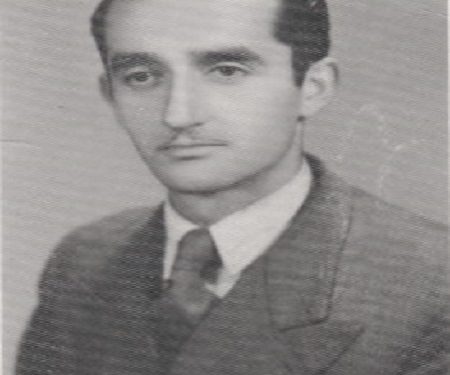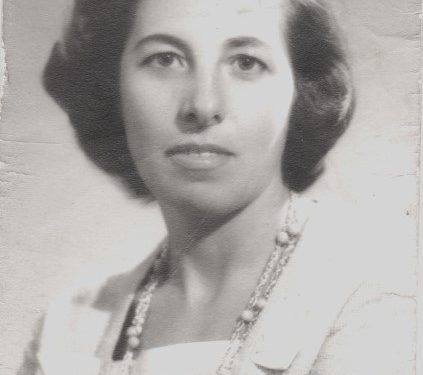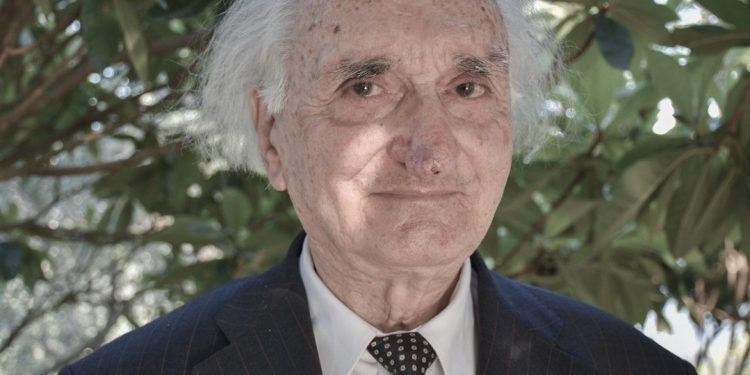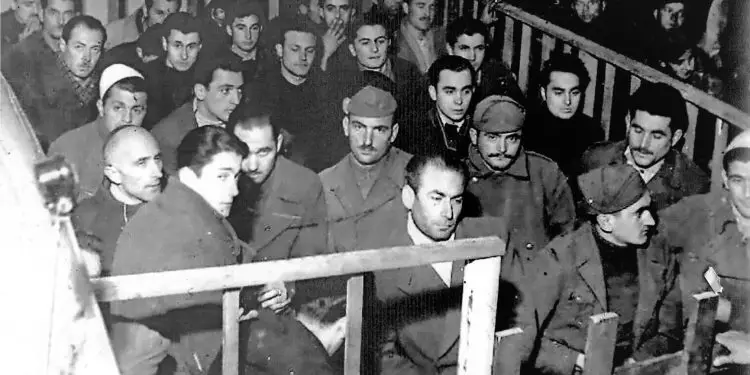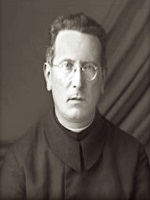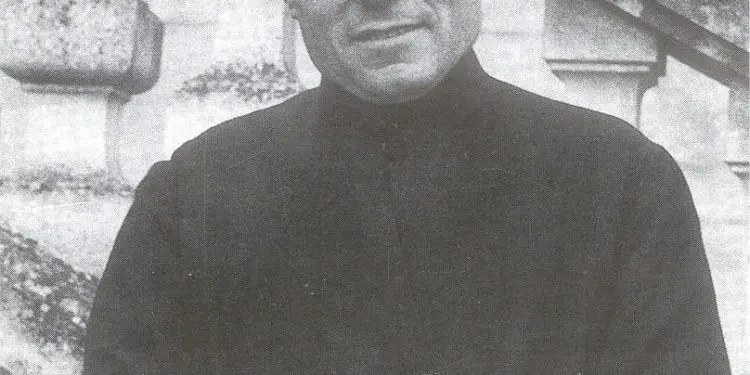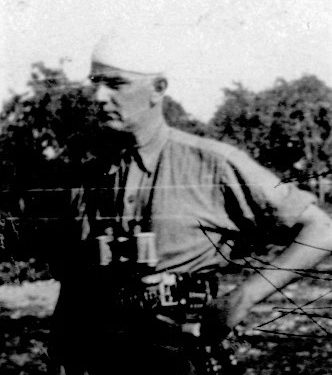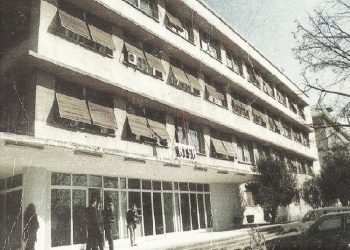From Lek Pervizi
Part eleven
THE ODYSSEY OF INNOCENCE
To my brother Valentin, who for 47 years straight,
endured the ideological storms of communism,
and what’s more, separated from his wife,
a true Odysseus in the middle of the twentieth century.
Memorie.al/As you enter Skuraj and cross the Urdhazës stream, the mountainous climb begins, across the hill called Lekbibaj. You pass three mills, known as Gjin Pjetri’s mills, which stand one after the other. You also pass the two-story tower of Ndrec Pjetri, Gjin’s younger brother, and then you come across a rocky ridge on which stands a complex of three stone buildings, the historic towers known as the towers of Gjin Pjetër Pervizi of Skuraj, the leader of the Kurbin uprising. These buildings dominate the entire valley formed by the joining of the Mat and Fan rivers (a branch of the Mat), all the way to Milot. It is almost a fortress that guards and protects the land from the expeditions of foreign invading armies that could penetrate that gorge, until they were met by the wall of the Skuraj Mountains, where the aforementioned towers stood.
Continued from the previous issue
The Old Prison
The old prison was much larger, and the rooms were wider with concrete floors. There were no beds, and the poor prisoners, when they lay down at night, were so crammed that they couldn’t even turn their bodies while sleeping. In one of these rooms, about a hundred people were crammed together.
For Catholic clerics (there were none from other faiths), wanting to isolate them out of fear that they might infect people with their doctrine or methods, they had devised a kind of closed cell with no windows and only a hole in the door, through which not even a hand could pass.
The others who had not yet been interrogated, about fifteen people, stayed in Valentin’s room.
More than a week had passed since he was transferred to the Big Prison when his wife sent a letter to Valentin through one of the two good guards, whose name was Remzi. She told him that she would get a special permit for a meeting. Three days later, the meeting guard called him, opened the iron door, and told him that his wife was waiting in the salon upstairs.
He went up the stairs and found himself in front of Gori, who immediately threw herself into his arms, weeping from longing after two years of being separated. She couldn’t open her mouth for as long as she was hugging Valentin, until a door opened and the director appeared. He wanted to be polite and invited them into his office, where they sat down and began to talk. It is not known whether the director understood Italian, but in any case, they continued to talk without his intervention.
Among other things, she repeated that her repatriation was necessary, which would give her the chance to get out of prison. There was no other, better solution. What could they do with that fate that had brought them to such a miserable and hopeless state? When they parted, Gori told him that if her repatriation permit was approved, she would get another special permit to meet with him, and she left him, sobbing. The prison friends had gathered in the small courtyard and followed the scene with emotion, because it was now known to everyone that Valentin was a completely innocent victim of the fate that had brought him to Albania at the worst possible time.
From this meeting, Valentin understood that she would be given a repatriation permit to get her away from him for good. And according to the opinion of the prison community, with the departure of his wife, he, Valentin, would not suffer a heavy sentence either. This matter had already been set in motion, and Valentin felt more relieved of the spiritual burden of having brought his wife to Albania in that catastrophic state, where, among other things, their family had fallen apart.
A Truly Special Trial
As we have said, Valentin would be a companion to all the events that occurred in the prisons of Shkodra, from 1944 until the end of 1946, where he remained for two years without a sentence, awaiting and seeing off dozens and hundreds of honest and innocent citizens and highlanders who were tortured, shot, or sentenced to prison, according to the decisions of special courts or people’s courts.
In those days, it was learned that many people had been arrested, most of them Catholic clerics, who had allegedly created a counter-revolutionary subversive organization. The news spread that a large amount of weapons and ammunition had been found hidden under the altars of the Great Church, a fact that would have worsened the situation of the arrested. Of course, for the prisoners, who knew the methods and actions of the communists more than anyone else, this news from outside was completely unbelievable? But the “masses” believed it, a good part of the people, deceived and drunk from communist propaganda.
These new events served to enliven their conversations. It wasn’t long before it was learned that the so-called “Special Court” would reopen its doors at the “Rozafat” Cinema. This time it was about the Catholic Clergy and others who would be implicated in that process. The sessions began where about twenty people would be tried, among them; two Italian missionaries, Father Gjon Fausti and Father Jak Gardini, and the Albanians Father Gjon Shllaku, Father Daniel Dajani, etc. The two Italians had lived in Albania for many years and taught at the Jesuit High School in Shkodra. The others belonged to the Albanian Catholic Clergy, most of them deacons and some lay people.
How the judicial process was conducted, everyone already knew. The same story: fabricated accusations from head to toe, to which were added the false statements of fake witnesses. At the end of the week, everything ended, with more than six death sentences and others with heavy prison sentences. The two missionaries, who were truly holy men, were sentenced to death, along with two Albanian priests.
It wasn’t long before they were taken and shot to the great joy of the “popular masses,” as that group of people, drunk from communist propaganda, called them, who considered those poor condemned people as prototypes of criminality.
That’s the state the people had been reduced to! But the main credit for that unfortunate achievement belonged to the leader of the regime, to the devil himself, Enver Hoxha, who, deep in his perverse mind, was nourished by such hatred that, unable to exterminate all the Catholics, he would declare state atheism, even though he himself was the son of a hoxha, just as Stalin was the son of a priest.
“Father” Stalin, with his “son” Enver, could not help but be nourished by the same criminal and bloodthirsty sadistic feelings. How to act differently?! Very simply: to permanently eliminate the Catholic faith, he had to sacrifice his own faith and the Orthodox one, a kind of resemblance to Samson with the Philistines. But for such a decision, the time was not right; he would leave that devilish decision for later.
Immediately after the so-called elimination of that “armed” subversive organization, which was said to have been led by those two eighty-year-old Italian missionaries, it was the turn of another group of political prisoners, among whom was a notorious former Sigurimi agent named Pierin Kçira.
The cinema hall was filled to the brim with people, who were distinguished by the loud noise, ready to hymn their “idol,” to whom, yelling like madmen, they donated years from their lives. A wild crowd that did not hesitate to stomp their feet on the floor, calling for the death penalty for all the defendants with rhythmic chants. But this time, those present could not imagine what would happen to the group of new defendants. When it was Pierin Kçira’s turn, he got up and approached the microphone suddenly, where with a thundering and clear voice, he declared without being allowed to speak, so quickly, lest they stop him and remove the microphone.
-“People of Shkodra, the Catholic Clergy is not at all guilty of actions against the state, therefore their process was just a setup. They are completely innocent. The weapons that were found under the altar, I placed them there myself with my own hands, on the orders of the heads of the party and the Sigurimi.”
Pierini concluded by declaring that all this was set up to eliminate the Catholic Clergy and the Albanian Catholic world. Pierini managed to speak so quickly that by the time the police arrived there to remove the microphone, he had finished his speech. He sat down completely satisfied on his bench, because he now felt free from that heavy weight that his soul had had to endure until that moment. Therefore, he felt ready to appear before God with a clear conscience. He knew very well that he would soon be leaving for the other world. They shot him immediately, along with some others.
The episode of Pierini fell like a real and unexpected bomb that greatly enraged the head of the regime. That incident should not have happened. Some Sigurimi people paid for this great carelessness, which exposed the Bolshevik system itself, which had gripped Albania in the claws of terror.
After Pierin Kçira’s speech, a great silence fell over the entire hall, so much so that you could hear the flight of a fly. But then the noise started again, with deafening shouts directed against that man who had had the great courage to publicly throw in their faces and expose the vileness of the Sigurimi and the courts, which were the most living proof of the most condemnable injustices, deceptions, and falsifications that could be imagined and that characterized the communist system, which the Western world could not recognize and understand.
Unfortunately, this is how the unjust and false justice of that regime functioned for 47 years. The defendants of this court session also received heavy sentences.
When the group of condemned came out, accompanied by the police, the crowd rushed upon them, to kill them with their own hands, especially against Pierini, but the police did not allow them. So those people were convinced that Pierini had made false statements, so drunk were they from the propaganda of the Communist Party, which found in them fertile ground to sow its evil seed.
This group also paid with six executed, among them Pierin Kçira, who showed himself to be a brave and determined man, like a true Albanian. Deceived and connected with the party and the Sigurimi, they had used him to set up the plan of the weapons hidden in the church. But after the trial of the Italian missionaries and the Albanian priests, who were then shot, Pierini understood that he had entered the wrong path by becoming a servant of the devil. Thus, without showing himself for a moment to the Sigurimi that he was capable of acts of courage and self-sacrifice, he waited for his trial to exonerate himself by telling the truth before the people of Shkodra, and to expose the setups and vileness of a regime that held power to commit crimes upon crimes, supposedly legitimized by courts and prosecutors, all in the service of terror and criminality, of a psychopathic and perverse leader. Alas for Albania and alas for the Albanians!
Llesh Marashi
One afternoon in the last week of January, while everyone was lying down, lost in their thoughts, a noise of voices and screams came from outside, entering through the small window high up on the wall. Valentin decided to look and, climbing on the back of a friend, he was able to make out a large crowd, partisans, and ordinary people, who were coming down the road with many people behind them, accompanying two tied-up men, tall and bearded, surely highlanders who had fled to the mountains and had been captured.
They stood out above all the others for their height and were guarded by Sigurimi people, armed to the teeth. They must have been important people, as so many people had gathered around them, yelling and cursing, and praising the party, the government, and the dictator. The road curved, and the crowd headed in that direction and disappeared. Valentin got down. Who could those two highlanders be, and how could they find out?
In order not to be noticed by the spies, Valentin told one of the other friends to ask Remzi’s cousin, who was on duty there. They learned that it was about Major Llesh Marashi and a relative of his, who had been captured that morning after a short fight near Koplik.
Llesh Marashi, as is known, was the one who, from mid-September 1945, led the uprising of the Great Highlands, which was called the Koplik uprising, 7 km from Shkodra, with the goal of then attacking Shkodra. With the hope that the other surrounding regions would also rise up, which did not happen and the uprising failed. Llesh and his men were forced to hide again in their mountains, pursued by numerous communist forces sent directly from Tirana to destroy them, under the command of Mehmet Shehu, the second super-criminal after Enver.
On this occasion, Mehmet established a five-day curfew in Shkodra, where hundreds of people were arrested, and there were many executions without trial. Valentin himself almost escaped, because he could have been eliminated by some commander or brigade commissar, or simply a partisan, without the order or knowledge of anyone, not even Mehmet Shehu himself.
Later, they learned that Llesh Marashi, with his nephew Rrok Kanti and cousin, Pjetër Bajraktari, had been hiding for almost a year and a half in a cave, on the side of a rocky mountain, very difficult to detect and reach. They were supplied with food by very loyal people, who, when they approached, would make the sound of a forest animal. Very rarely, his nephew, Rrok Kanti, would come out to check, a handsome, powerful, and very agile young man, who had distinguished himself in fights against the communist forces.
The cave was in a secret, very safe place, which was not even thought to be discoverable. But it seems that some spy must have noticed the movements of the people who were carrying food, no matter how much they tried not to be seen.
When the Sigurimi forces surrounded the place, the commander had asked for their surrender, but at that moment, Llesh’s nephew, Rroku, had lunged behind a rock and had started shooting. In the first shots, two soldiers were wounded, and even though Llesh called to his nephew, Rrok Kanti, to stop the fire, he did not want to know and continued to fight with unmatched bravery.
But the encirclement tightened even more, and Rroku saw that he had few bullets left, so he made the final decision, better to kill himself than to fall into the hands of the communists, so he pointed the revolver at his chest and shot. Meanwhile, the commander called to Llesh to surrender, that there was no other way out. Llesh replied that if it were up to him, he would never have surrendered, but he was thinking about the life of his nephew and his cousin, so of Rroku and Pjetri. If he guaranteed their lives, then he would surrender.
In this case, Llesh knew nothing about Rroku, who had killed himself. The commander, after consulting with the commissar, replied that they accepted that condition. So Llesh Marashi and Pjetër Bajraktari surrendered and were brought to Shkodra. Only then did Llesh find out that Rroku had been killed (allegedly), and he regretted his surrender. They found Rroku lying down, with a large wound in his chest and a lot of blood loss, and they thought he was dead. But the commander had approached and had noticed that he was still alive, so he had given the order to prepare a kind of stretcher with some logs to lower him to a place where a car could come. This was done and Rroku was taken by a car and sent to the Shkodra hospital, where he was operated on urgently, saving him from death.
After he recovered, Rroku was taken for interrogation, to get necessary information from him, especially about his uncle, but it was in vain, he did not accept any of it, enduring even the methods of torture.
To fulfill this event, Lesh Marashi was kept for a long time in the prison cells, almost a year, thus isolated. But as far as is known, he was not tortured. It is thought that they wanted to break him and win him over, promising him some important position. This, it is said, was so that through him, the communist regime would find it easy to destroy all the fugitives of the north, and mainly those with weight and influence among the people, such as; Mark Gjomarku, Prenk Pervizi, Muharrem Bajraktari, and others. Of course, Llesh Marashi proved to be undefeated. They executed him by hanging him in the middle of Shkodra in 1946.
The prisoners did not forgive the act of surrender. A figure likes him, and what’s more, a military man, like Llesh Marashi, should not have surrendered alive, into the hands of the ragtag partisans. Memorie.al




